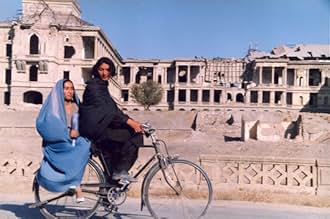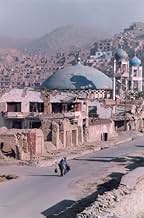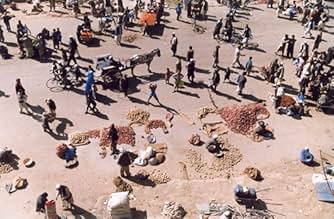Panj é asr
- 2003
- 1h 45min
CALIFICACIÓN DE IMDb
6.8/10
1.6 k
TU CALIFICACIÓN
Agrega una trama en tu idiomaIn a post-Taliban Afghanistan a young woman (Agheleh Rezaie) attends school against her conservative father's will, hoping to learn more about democracy to fulfill her dream of being the cou... Leer todoIn a post-Taliban Afghanistan a young woman (Agheleh Rezaie) attends school against her conservative father's will, hoping to learn more about democracy to fulfill her dream of being the country's next president.In a post-Taliban Afghanistan a young woman (Agheleh Rezaie) attends school against her conservative father's will, hoping to learn more about democracy to fulfill her dream of being the country's next president.
- Dirección
- Guionistas
- Elenco
- Premios
- 4 premios ganados y 2 nominaciones en total
- Dirección
- Guionistas
- Todo el elenco y el equipo
- Producción, taquilla y más en IMDbPro
Opiniones destacadas
In a devastated Afghanistan post-Taliban, Nogreh is a woman that goes to a school without the knowledge of her conservative father that sees blasphemy everywhere. She dreams on becoming President of Afghanistan, but wears burqa and fears her father; she is interested to know whether there are other women presidents further to the Pakistani prime-minister Benazir Bhutto; and she wants to know their speeches to be elected president. Nogreh wanders with her father and her sister-in-law Leylomah with her baby in a buggy with their old horse. Leylomah is seeking-out her missing husband Akhtar and has problem to feed her baby due to her own starvation. Along their travel for survival, they see their country devastated by war and misery.
"Panj É Asr" is a very sad tour though Afghanistan, a country devastated by the civil war, the successive invasions and war against Russians and Americans and the Taliban regime since the 70's. It is impressive to see only ruins of former cities and palaces, and the poor and illiterate people dying without food or water. The ignorance of the common people and the treatment to the women are also amazing. This movie is a sort of documentary and despite the lack of resources and the flawed screenplay, the director Samira Makhmalbaf has the merit of exposing these wounds to the world. My vote is six.
Title (Brazil): "Às Cinco da Tarde" ("At Five in the Afternoon")
"Panj É Asr" is a very sad tour though Afghanistan, a country devastated by the civil war, the successive invasions and war against Russians and Americans and the Taliban regime since the 70's. It is impressive to see only ruins of former cities and palaces, and the poor and illiterate people dying without food or water. The ignorance of the common people and the treatment to the women are also amazing. This movie is a sort of documentary and despite the lack of resources and the flawed screenplay, the director Samira Makhmalbaf has the merit of exposing these wounds to the world. My vote is six.
Title (Brazil): "Às Cinco da Tarde" ("At Five in the Afternoon")
In "At Five in the Afternoon", we follow the fortunes of a young woman in Afghanistan and her family. Nogreh is caught between two worlds. On the one hand, she attends a school where the teacher encourages girls to become doctors, engineers and even President. At the same time, Nogreh must wait until she steps out of her father's home before she lifts the veil of her burka and trades flat-soled shoes for high heels.
Nogreh is a very idealistic and ambitious young woman who emulates Benazir Bhutto of Pakistan and dreams of being President of her own country some day. Yet she has been kept in a state of childlike naivety and ignorance about politics at home and abroad, due to the teachings of the Koran, Shariah (Islamic law) and the Taliban.
It is exciting to hear the young girls debate the status of women in their country. But the film is also sympathetic and understanding toward the old Afghanistan, symbolized by Nogreh's father. He bewails that "Blasphemy has overrun the city" and the world, as he knew it, has ceased to exist. To add pathos to the situation, he feels he can confide his feelings only to a dumb animal -- his donkey, who "knows nothing but hay".
The film's title echoes a recurring verse from Federico Garcia Lorca's poem, "Lament for Ignacio Sanchez Mejia", about the goring of a bullfighter. Like Lorca's poem, "At Five in the Afternoon" is clouded over by a somber atmosphere of tragedy, death and despair. Yet the film remains remarkable for its astonishingly hopeful -- and indeed radical and revolutionary -- vision of hope for Afghanistan and indeed all of the Arab world.
Nogreh is a very idealistic and ambitious young woman who emulates Benazir Bhutto of Pakistan and dreams of being President of her own country some day. Yet she has been kept in a state of childlike naivety and ignorance about politics at home and abroad, due to the teachings of the Koran, Shariah (Islamic law) and the Taliban.
It is exciting to hear the young girls debate the status of women in their country. But the film is also sympathetic and understanding toward the old Afghanistan, symbolized by Nogreh's father. He bewails that "Blasphemy has overrun the city" and the world, as he knew it, has ceased to exist. To add pathos to the situation, he feels he can confide his feelings only to a dumb animal -- his donkey, who "knows nothing but hay".
The film's title echoes a recurring verse from Federico Garcia Lorca's poem, "Lament for Ignacio Sanchez Mejia", about the goring of a bullfighter. Like Lorca's poem, "At Five in the Afternoon" is clouded over by a somber atmosphere of tragedy, death and despair. Yet the film remains remarkable for its astonishingly hopeful -- and indeed radical and revolutionary -- vision of hope for Afghanistan and indeed all of the Arab world.
Was not the sanction against Taliban led by the US to bring dawn into Afghanistan? Noqreh goes back and forth between her father, who believes neither education nor jobs are necessary for women, and the school, where teachers encourage female students to have any job, even the president.
Her family generously offers the place they live to the refugees coming back from Pakistan. Soon they have to go out from there, and without food, the dream of becoming the president fades out. Her white shoes become useless.
It seems the whole of the movie is a poem. That a high school girl dreams to become the president is a poem too. Maybe it is the best way to describe the world Noqreh lives in, which is at five in the afternoon, not in the morning.
How can the country, where just seeing the face of woman is sin, be open to the world? The country which was destroyed and lagged a long way behind the world by men, who are taught as superior creatures than women. Only the belief that God never dies supports them. Tough I have my belief as a Christian, I never want to shut myself away into the world of illusion.
Her family generously offers the place they live to the refugees coming back from Pakistan. Soon they have to go out from there, and without food, the dream of becoming the president fades out. Her white shoes become useless.
It seems the whole of the movie is a poem. That a high school girl dreams to become the president is a poem too. Maybe it is the best way to describe the world Noqreh lives in, which is at five in the afternoon, not in the morning.
How can the country, where just seeing the face of woman is sin, be open to the world? The country which was destroyed and lagged a long way behind the world by men, who are taught as superior creatures than women. Only the belief that God never dies supports them. Tough I have my belief as a Christian, I never want to shut myself away into the world of illusion.
The movie title, and one of its main axis, comes after a fragment of a poem written by Spanish poet Federico Garcia Lorca, called 'Llanto por la muerte de Ignacio Sánchez Mejías', dedicated to the death in 1934 of a Spanish Torero.
This poem is often seen as a premonition of Garcia Lorca's own dead, near Fuente Grande, and of the Civil War that was soon to desolate Spain.
Samira Makhmalbaf comes again with an anguishing tale of a woman that wants to believe in the role of women in a modern society while her own family is disintegrating around her.
This poem is often seen as a premonition of Garcia Lorca's own dead, near Fuente Grande, and of the Civil War that was soon to desolate Spain.
Samira Makhmalbaf comes again with an anguishing tale of a woman that wants to believe in the role of women in a modern society while her own family is disintegrating around her.
What made me write the comment about this film was the post signed by "ingemli". It is easy bullshitting arrogantly about this film while sitting in the air-conditioned cinema, eating pop corns and feeling sleepy. Samira Makhmalbaf went to Afganistan after the Taliban regime was toppled, and decided not to stay a silent observer of a hard life she faced with. Together with her famous father (Mohsen Makmalbaf wrote over 30 scenarios and directed about 20 films) she developed the script and was determined to film it in Afghanistan. It was difficult to find the actors, especially a native woman who would interpret the main character who shows her face, as the country lacks professional actors. Keeping all this in mind, it all ended pretty well with non-professionals. I am not telling that this film is a masterpiece, but it has its value and deserves respect. This is a tale of a young woman who, despite his father's religious fanaticism and prohibition that she goes to school, insists to get educated to become "the president of the republic". She goes to school without her father's knowledge, putting on the white high heels and uncovering her face. The shoes, actually pretty ugly and unsuitable for walking through the ruins, have strong symbolic meaning of her rebelled femininity. Ms. Makhmalbaf follows her heroine and hers family through the hard times of loosing illusions about the possibility not only for social advancement but simple survival. I knew this strange country only by bad news on TV. This film served as a window on its other, hidden side the ordinary people's life struggle and that's its most admiring part.
¿Sabías que…?
- TriviaSamira Makhmalbaf had difficulty casting the lead role of Nogreh because many women refused to appear on camera without their burqa. Agheleh Rezaie was her second choice after the initial woman she cast dropped out after Makhmalbaf said she would have to show her face to the camera.
- ConexionesFeatured in Lezate divanegi (2003)
Selecciones populares
Inicia sesión para calificar y agrega a la lista de videos para obtener recomendaciones personalizadas
Detalles
Taquilla
- Total a nivel mundial
- USD 515,144
Contribuir a esta página
Sugiere una edición o agrega el contenido que falta

Principales brechas de datos
By what name was Panj é asr (2003) officially released in India in English?
Responda


















